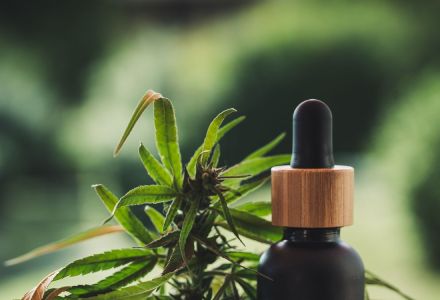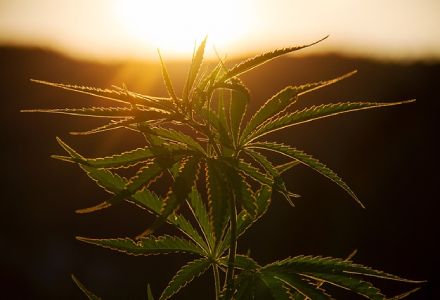Both CBD and THC interact with the endocannabinoid system, which regulates many processes in the human body, such as inflammation levels, anxiety, appetite, memory, and more. But which one does it better? Let's put these two big players against each other in a friendly battle and find out!
A brief definition of the terms you need to know.
Who are our contestants? Both CBD and THC are cannabinoids found in the cannabis plant. The most significant difference between the two is that THC has psychoactive effects and can get you "high". CBD, on the other hand, while also capable of influencing how you feel, will never cause uncontrollable euphoria.
CBD represents Team Hemp, a species of the Cannabis sativa plant known for producing large amounts of CBD and only traceable amounts of THC (usually under 0.3%), not enough to have any psychoactive effects.
THC represents Team Marijuana, another variety of the Cannabis plant. While marijuana produces CBD, it is mainly grown for its high THC content (at least 15%).
Both contestants have a large group of faithful fans and supporters. But how will they compete against each other?
Questions & answers - between myth & truth #CBDknowledge
The rules of the game are simple. 5 rounds, 2 contestants, 1 winner. Let the best cannabinoid win!
Currently, studies about this topic(s) are not representative. Fundamental statements about improvements of problems and/or conditions, therefore, can't be done. CBD isn't medication!
Round 1 - CBD vs THC for: Anxiety
Many of us struggle with anxiety from time to time. A demanding job, busy family life, an unexpected pandemic. All these things can be anxiety-inducing. Research suggests THC can also be anxiety-inducing when consumed by people already prone to feeling uneasy. Not a great start for Team Marijuana!
To make things more interesting - our current understanding of the interaction between various cannabinoids suggests that one of the many potential benefits of CBD is that it can counteract the anxiety-inducing effects of THC.
Additionally, research on animals has shown that CBD can reduce anxiety symptoms, such as uneasy behaviour and increased heart rate. There is no doubt that CBD wins the first round!
Round 2 - CBD vs. THC for: Better sleep
Good quality sleep is crucial for good health. Can CBD or THC help us sleep better? With drowsiness and sleepiness being one of the top side effects of THC, one might think that THC would be the instant winner.
But what we are talking about here is not the ease of falling asleep but the quality of sleep, which puts THC in a difficult position. Early research suggests that high THC consumption might interrupt the REM sleep phases, crucial for quality sleep. CBD, on the other hand, will not.
While THC might be helpful for people with insomnia, CBD can be more effective in helping you switch off and relax without interrupting your REM sleep. This means that the winner is, yet again, CBD. Although we admit that this one was a close round.
Round 3 - CBD vs. THC for: Pain relief
Both CBD and THC can be helpful pain management tools. Researchers are only starting to understand the relationship between cannabis and pain management. Anecdotal evidence suggests that cannabis with high THC levels could be helpful for people who struggle with chronic pain resulting from accompanying illnesses, such as cancer, AIDS or spastic and movement disorders.
But what about the pain caused by inflammation or injuries? Considering that CBD shows anti-inflammatory properties, it can be a helpful tool for pain management resulting from inflammation (such as arthritis). Early research suggests this might be the case, especially when infused into topicals and used directly on the source of pain.
While both contestants gave an outstanding performance and the decision was hard to make, THC won this round.
Round 4 - CBD vs. THC for: Migraines
Migraines, usually expressed in excruciating headaches, sometimes accompanied by nausea and sensitivity to noise and light, can be all-consuming and are very hard to manage. Is cannabis the answer? It's tough to say.
Even though all migraine headaches feel similar, they can have different causes. According to some older research, while both THC and CBD have the potential to be helpful in case of stress-induced migraines, patients experiencing migraines caused by hormonal imbalance might experience worsening conditions after consuming THC. But this trend does not seem to appear in more current research.
Because migraines are often experienced differently by different people, the type and ratio of cannabinoids that can help alleviate symptoms might differ from person to person.
And since some migraine sufferers might benefit more from CBD than THC (and vice versa), the winner is impossible to know. Therefore, it’s a draw!
Round 5- CBD vs. THC for: Fibromyalgia
Fibromyalgia, also referred to as FMS, causes pain in different parts of the body without any identifiable cause. We still have a lot to learn about fibromyalgia and how to use cannabis to manage its symptoms. But what we do know is promising.
A recent study in Italy tried to understand the impact cannabis can have on the lives of people with fibromyalgia. The study participants suffered from FMS, but didn't find any pain relief from conventional treatment and were willing to try medical cannabis for 6 months.
The study found that most participants self-reported an improvement in symptoms. This result suggests that cannabis could be considered as a potential treatment for FMS patients who are resilient to traditional pain medication.
But because the research used cannabis with both THC and CBD, we cannot tell which cannabinoid helped the most. This might be because, despite being contestants in this article, THC and CBD can work well together. Therefore, it is only fair to announce a draw.
A small difference in structure but huge in effect
The differences in the chemical structure of both cannabinoids are microscopical. Yet, they each play a different role.
The advantages of CBD & THC
It will take a while before we understand all of the benefits of cannabis. Early research suggests CBD can be beneficial for people fighting:
- inflammation
- pain
- anxiety
- migraines
- IBS
- and even seizures
At the same time, THC might be an excellent tool for chronic pain management, MS, insomnia, nausea and low appetite. And this is all just the beginning.
The disadvantages of CBD & THC
While cannabis is a great plant, its consumption might cause some side effects. A rare but unpleasant side effect of THC is panic and psychosis, which CBD can counteract. But other side effects of THC, such as mental confusion or sleepiness, are a bit harder to overcome.
The most common disadvantages of CBD are dry mouth, loss of appetite, and fatigue, which usually goes away after the first few weeks of regular use.
Both CBD and THC can interact with some medications. While it often can be solved by avoiding taking your medicine and CBD or THC simultaneously, you should consider consulting your doctor if you are on daily medications and planning to add one or both of these cannabinoids to your diet.
So who's actually winning the battle?
While CBD has won this particular battle, both THC and CBD showed great sportsmanship. Every single cannabinoid present in the cannabis plant has the potential to impact our wellbeing. Many specialists believe that cannabinoids are team players and perform best when consumed together - a phenomenon known as the "entourage effect".
If you yourself want to experience the entourage effect, broad and full-spectrum CBD products are an excellent choice. And if you are only interested in one winner, CBD is the way to go.
CBD has to be registered as a cosmetic product in Germany. For this reason, we are only selling CBD oil spray which is a product for oral hygiene. That's also why you shouldn't swallow it.
Other countries like the UK for example can register CBD as a nutritional supplement. That's why you will find most of the CBD oils as drops using a dropper as an applicator.




